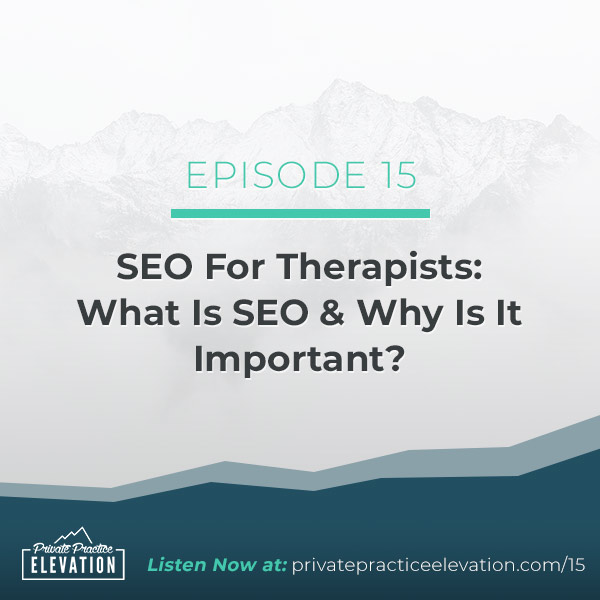SEO (Search Engine Optimization) can be one of the most important parts of using your private practice website to get more clients.
In this article, you’ll learn what it SEO is and some of the most important factors that decide where your website will show up in search results.
What Is SEO (Search Engine Optimization)
Let’s start at the very beginning.
If you’re new to working with a website for your private practice, you may have never heard of SEO.
Or perhaps you’ve heard the term, know it’s important but are not sure why.
SEO stands for search engine optimization. It’s the practice of applying various techniques in order to increase the amount of traffic you get from search engines.
Ideally, this traffic would be from people who are searching for information related to your private practice, services, or niche.
You don’t want Google sending you a bunch of traffic for people searching for a “couples retreat” when you only offer “couples therapy”.
You also want this traffic to come to your website organically, meaning you need to pay to show up high in the search results.
So, when someone types in a search in Google, let’s say for “couples counseling in Atlanta”, you want your website listing to show in the search results, preferably at the top of the list.
There are many factors that go into whether your therapy website will appear in the results, and that’s what SEO is all about.
A Brief History of SEO
Many years ago in a far off place, known as the ‘90s, this thing called the internet was gaining momentum.
Websites were popping up all over the place and people were beginning to share their interests and information on whatever topics they wanted.
Because so many websites were being created, it became to difficult to actually find them.
Directory websites, such as Yahoo!, were popping up and you had to manually submit your website to be included.
I remember those bars that would appear at the top of websites that would take me to other sites, related to the topic, again a manual connection that someone had to set up and others would submit their site to be included.
So search engines began popping up as more and more people were trying to use the internet to find information.
Some of the earliest ones were AltaVista, Ask Jeeves, Excite, Infoseek, Lycos, and Yahoo.
In this early stage of SEO, getting your website to rank well was fairly straightforward: have enough content on the page and repeat the keywords enough times so that search engines know what you’re all about.
Basically, the website using a keyword 100 times in a web page’s text and meta tags would rank higher than one using a keyword 50 times. Simple, right?
But the repetition of keywords does not a relevant and helpful website make.
In 1996, improvement of the SEO landscape was being made by Sergey Brin and Larry Page who began building a search engine called BackRub, which later became known as Google in 1997.
What they did that was so revolutionary to what other search engines were doing was that they were ranking search results based on a constantly-updated algorithm that would connect users to the most relevant content that they were looking for.
They didn’t look at just on-page factors (like how many times your keyword appeared) but they also looked at external factors, such as the quality of other websites linking to a website.
Slowly the old ways of hacking your way into a Google page-one rank came to an end as website owners and marketers had to adopt more ethical ways of appearing at the top of search results (i.e. provide the most relevant content!)
And in 2000, Yahoo! partnered with Google so that all their search results were powered by this new search engine. All search results showed the words “powered by Google” and Google soon became extremely popular.
And since then, Google has continued that initial quest to display to its users the most relevant and best information based on a user’s intent (what they want to do with the info their searching for).
How SEO Works
So what’s actually going on now when your potential client types “couples counseling in Atlanta” into a Google?
The way it works is that Google “crawls” or scans the internet and gathers up information on all the content it sees.
All that content and private practice websites are then fed through an algorithm that ranks that information based on what it thinks the potential client is looking for and displays an index of web pages in the form of their search results.
Now if you do, in fact, provide couples counseling in Atlanta (like my wife!) then there are a number of factors that will affect whether your website is shown high on that list of search results.
This is where the “optimization” piece comes in…
What Effects Your Therapy Website Rank in Google
Ok so now we’ve got some context of what SEO is and how search engines work to help your potential clients find your private practice website.
But what are some of the things that actually can help them find you?
What’s going to put you on Google page one and get organic, free traffic to your website and land more clients?
Well, according to Backlinko, there are actually over 200 ranking factors that Google’s algorithm cares about.
But try not to let that overwhelm you!
While there may be many, some hold more weight than others and I encourage you to focus your SEO efforts there, at least as a way to get started.
According to Search Engine Journal, here are the most important ranking factors at the time of writing this post (2019):
1: Publish High-Quality Content on Your Private Practice Website
Great content is the foundation and most important part of getting your private practice website to rank well in search engines.
Why would Google send traffic your way if you’ve only got 500 words about your work around couples therapy when there are other websites that are filled with many pages and blog posts about the topic.
Remember, Google wants to show the user the most-relevant and best content.
You want your content to go deep on specific topics in order to increase the amount of time your potential clients are on your website and decrease your bounce rates (the percentage of people who leave your website without reading the content). This tells Google that people find your content useful.
This is also where a little keyword research comes into play.
When you understand the terms that your potential clients will type into Google to find the content you’re writing, then you can include those terms in the content and go really deep on the subject.
Related: From DIY Website To Google Page 1: How One Therapist Created a Successful Hypnotherapy Website
2: A Mobile-Friendly Therapy Website
Having a website that displays the same content on a mobile device as on a desktop computer is one way to help your website rank.
This is why when I and my team build websites, we use what’s called “responsive design”.
This just means that the web page will adjust to display the content so that it’s legible no matter what size screen the user is viewing it on.
Google has stated that their algorithm will look at the mobile version of your site first when it comes to indexing it in search engine results.
3: Create A Secure Website (HTTPS) For Your Private Practice
Back in 2014, Google announced that having a secure website – ones that use HTTPS and have security certificates tied to the domain – was one of their ranking signals.
Just switching your website from HTTP to HTTPS is not likely to give you a huge boost in the ranking of your website, but it’s something Google looks at.
In fact, if you don’t use HTTPS, the Chrome browser will flag your website, prompting users to acknowledge that the website is not secure before preceding.
So you don’t want a potential client to see that warning instead of landing right on your website.
4: Make Your Website Easy To Use
User experience is also an important factor that Google takes into account when ranking a website.
This means that your website is easy to use and information is easy to find.
Search Engine Journal states, “Search engines look at dwell time as a signal to see the amount of time a user spent on a site before clicking the back button to return to the search results.”
So if a potential client lands on your website, get totally confused and doesn’t know where to click so they return to the search results page, this could hurt your rank.
You want to make it as easy as possible for people to find the information they’re looking for.
Having a very clear navigation menu with proper hierarchy can help here.
For example, instead of just linking “Couples Therapy” in your menu, you could include a sub-navigation with the terms “Pre-marital Counseling, Divorce Counseling, and Communication” and create pages for each of these terms.
5: Optimize Your Private Practice Website Page Speed
The slower your site loads, the more you’ll miss out on those potential clients.
In another attempt to acknowledge the importance of mobile use of websites, Google considers page speed to be an important factor for ranking.
You can use a tool like Pingdom’s Speed Test to see how fast your website is loading.
And if you’re on WordPress, there are many caching plugins that you can use to help optimize your website’s code so that it loads faster.
We take this into account when we create custom websites for private practices by using the Divi theme combined with our high-speed WordPress Hosting.
If your website takes ages to load, your potential clients may just move right along to the next practice.
6: Use On-Page Optimization
On-page optimization includes the steps you can take to make your content be found more easily by search engines.
It’s all the stuff you can do on the page you’re trying to optimize.
These are the factors that are mostly in your control – they are places you can put your keywords on the page you’re working on.
Some examples of things you can do:
- Write a meta description for each page and blog post making sure to include the keyword or phrase you want to rank for
- Make sure the title of your page or blog post is in an H1 tag and includes your target keyword
- Use descriptive ALT tags for each image on the page and include, you guessed it, your keyword
For more info on On-Page SEO, check out this article here.
7: Get Links From Relevant and Authoritative Websites
Links from other notable websites related to your private practice continue to be of very high importance.
I’d say after you create a foundation of high-value content for your private practice, getting links back to your website is the next in importance.
When multiple websites that are related to your topic or therapy niche are linking to your website, it shows Google that your website is important.
Each link to your website is like a vote for your content.
A simple search for your domain in Moz’s Link Explorer will show how well your website is doing in terms of links to it.
There are some simple things you can do like making sure your website is linked to any directory you’re a part of or including it in all your social media profiles.
But even more clout will be given to a link from a website that’s extremely relevant and hold high-authority in your field.
This could include writing a guest blog post or article for another website and including a link back to yours.
Google likes diversification of backlinks that look natural. So instead of trying to get other people to link the text “couples counseling in Atlanta” on their website to yours, start with building many links that just go to your domain (www.example.com) or the name of your private practice.
Why SEO Is So Important For Private Practice Success
There are many examples of therapists who have used SEO to get more traffic to their website based on the terms they want their clients to use to find them.
You can read about two: here and here.
SEO has the potential to organically attract new clients to your private practice.
These are people who haven’t heard about you, but are searching for answers to their challenges… the very challenges you can help them with!
Doing the work to make sure your content is optimized and able to be found in search engines could mean not just more clients for your private practice but that the people who need your help can actually find you.
Search engine optimization can be a great marketing investment as it can bring in new clients month after month and grow your traffic in exponential ways.


